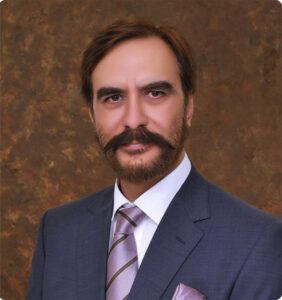Ansar Burney
Credentials
Humanitarian Cause
Human Rights, Community Sensitization on Human Rights and Civic Engagement, Documenting and Reporting Human Rights Violations, Human Rights Advocacy, Legal Support, Restoration of Justice, Unlawful Imprisonment and Detention
Impact Location
Pakistan
Occupation
Lawyer / Human Rights and Civil Rights Activist
Photo Gallery
About Ansar Burney
Ansar Burney is a trailblazing human rights advocate and lawyer who has dedicated his life to fighting for civil liberties and the dignity of marginalized individuals across Pakistan and internationally. Inspired by a strong sense of justice and commitment to the public good, Ansar Burney embarked on a mission to challenge the systemic injustices he witnessed during his own incarcerations under Pakistan’s regime.
Born on August 16, 1956, in Karachi, Pakistan, Burney gained prominence for his outspoken advocacy for democracy, human dignity, and civil rights as a student leader with the People’s Student Federation during the oppressive Martial Law era of the 1970s.
At the age of 20, he was imprisoned for the first time for delivering pro-democracy speeches, facing three separate detentions between 1977 and 1980. During his time in various Pakistani jails, Burney was confronted with the heartbreaking realities of prisoners who had either been falsely accused, remained in jail without charge, or had already served their sentences but simply fell through the cracks and were never released. Some had languished in prison since the 1947 Partition of India, a testament to the deeply flawed justice system.
After obtaining his Master of Laws degree from Karachi University and following his release in 1980, Burney founded the Prisoner’s Aid Society, the first organization in Pakistan to advocate for the rights and welfare of prisoners. His efforts quickly expanded as he established the Commission Against Terrorism and the Bureau of Missing and Kidnapped Children. These organizations were eventually consolidated under the umbrella of the Ansar Burney Trust International (ABTI), which was formed in Karachi and later expanded to Islamabad, Peshawar, Mirpur, Quetta, Washington D.C., and London.
The Ansar Burney Trust International became a pioneer in human rights work in Pakistan. It was the first organization to introduce genuine human rights advocacy, challenging widespread injustices and addressing issues such as wrongful confinement, corruption, child abuse, and cruelty against women. Burney’s organization was non-political, non-governmental, and non-profit, and its primary mission was to combat all forms of human rights violations without discrimination.
In the decades since its establishment, ABTI has achieved remarkable milestones in advocating for the rights of the vulnerable. The Trust has freed over 900,000 individuals from wrongful imprisonment and mental asylums in Pakistan and abroad. It also provides free legal advice, humanitarian assistance, and works extensively on issues of domestic violence, child rights, and disaster relief. Burney’s efforts to reform Pakistan’s prison system, improve the treatment of prisoners, and raise awareness about civil liberties have had a lasting impact on the country’s human rights landscape.
Burney’s international work is equally notable. One of his most impactful campaigns was against human trafficking, particularly focusing on the horrifying practice of using child camel jockeys in the Middle East, especially in the United Arab Emirates (UAE). Children from South Asia and Africa were trafficked, underfed, and trained to race camels, often starting as young as two years old. Burney’s relentless activism led to international attention on the issue, and his advocacy resulted in significant changes in countries like the UAE and Qatar, which opened shelters for rescued camel jockeys. By 2005, 68 children had been rescued, and 43 repatriated, thanks to Burney’s efforts.
“I am working for human beings. I have nothing to do with the boundaries. I have nothing to do with religions.”
In recognition of his tireless campaign against child trafficking and modern slavery, Burney was honored by the U.S. Secretary of State, Condoleezza Rice, as an Anti-Human Trafficking Hero in the U.S. State Department’s 2005 Trafficking in Persons Report. Burney has continued to combat bonded labor in Pakistan and advocate for greater protections for trafficked individuals worldwide.
Throughout his career, Burney’s work has expanded to include a wide range of human rights issues. He has been instrumental in providing disaster relief, particularly in the aftermath of natural disasters, and has collaborated with government agencies during the COVID-19 pandemic to assist educational institutions and families in need. His Trust also played a key role in repatriating Pakistani travelers stranded abroad due to global lockdowns.
Ansar Burney’s contributions to human rights go beyond his work with his own organization. In 2007, he was appointed Pakistan’s Federal Minister for Human Rights, further amplifying his influence in advocating for those without a voice. He also served as an Expert Advisor on Human Rights at the United Nations from 2007 to 2011, where he worked on global human rights initiatives.
“I don’t want to see tears in the eyes of any human being. I want to give them a smile and a feeling of happiness. So, once I give justice to any human being, I feel very strong and very happy.”
Despite decades of progress, Burney continues to confront the ongoing challenges of human trafficking, especially the illegal use of child labor in camel racing, which, though diminished since 2005, persists in certain regions. Burney remains committed to finding and rescuing trafficked children and continues to advocate for stronger enforcement of anti-trafficking laws and policies, remaining a beacon of hope for those suffering from injustice and exploitation.

